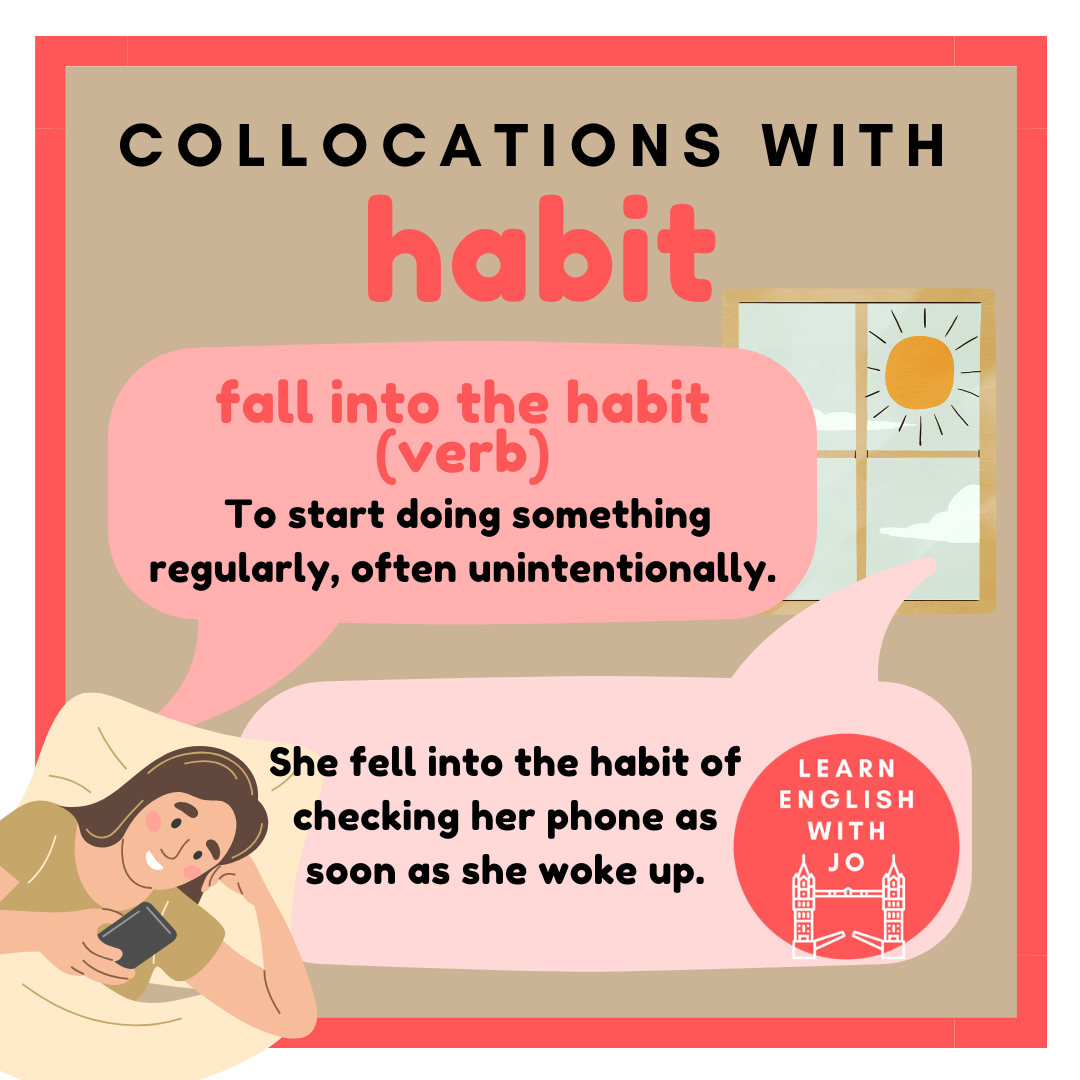Collocations for talking about habits in English.
Habits play a significant role in our lives. They can be the building blocks of success or the stumbling blocks of failure. For English as a Foreign Language students, developing positive habits can be particularly important in the journey to proficiency.
This week in my English conversation classes, some of my students have been talking about cultivating good habits and kicking bad habits. In the process we have explored some collocations that are commonly used when talking about habits in English. These are a few of the phrases and expressions we came up with
Fall into the Habit
Falling into the habit is often unintentional. It happens when we start doing something regularly and we know it, it has become an ingrained habit. This phrase highlights how habits can sneak into our lives without us even realizing it.
Example
She fell into the habit of checking her phone as soon as she woke up.
Kick the Habit
We all have habits we wish we could do without. For EFL students, this might include procrastination, late nights or being overly critical of your English skills . To improve, it's important to identify these detrimental habits and kick the habit to make room for more constructive or healthy ones.
Example
It's not easy to kick the habit of smoking, but it's important for your health.
Break the Habit
If you break a habit it means that you manage to stop doing something that you regularly do, often with effort and determination. Breaking the habit is similar to kicking a habit and it can be a challenging process, but it's crucial for personal wellbeing and good health.
Example
He finally managed to break the habit of biting his nails.
Habit of a Lifetime
A habit of a lifetime is one that has been with you for as long as you can remember. When it comes to language learning, developing a habit of a lifetime involves making it a daily part of your life. Consistency is key.
Example
Her morning yoga session was a habit of a lifetime that kept her fit and healthy.
Get into the Habit
Sometimes, the most challenging part is getting started. When we get into the habit of doing something we start doing something regularly and develop a routine.
Example
I got into the habit of reading a few pages of a book before going to bed.
Develop the Habit
Habits don't form overnight. ‘Developing the habit’ of studying English regularly is a gradual process. Start small, and as you see progress, you'll find it easier to maintain this habit.
Example
If you want to improve your writing skills, you need to develop the habit of writing every day.
Out of Habit
Sometimes, we do things out of habit without much thought. When we do something out of habit we do it automatically or without thinking, often because it's a routine. While this can be useful for routine language practice, it's important to stay mindful and avoid slipping into autopilot mode, especially when learning a new language.
Example
He opened the refrigerator out of habit, even though he wasn't hungry.
Creature of Habit
We often hear people described as creatures of habit. This phrase underscores the idea that our habits define us. As an EFL student, consider whether your habits align with your language-learning goals and make necessary adjustments.
Example
She's a creature of habit; she eats the same breakfast and follows the same schedule every day.
Establish the Habit
To master a new language, you must establish the habit of consistent practice. Set specific, achievable language goals, and then build your daily or weekly routines around these objectives.
Example
It took a few weeks to establish the habit of going to the gym after work.
Force of Habit
Force of habit is a powerful influence on our behaviour. Make your language-learning habits so ingrained that they become second nature. Eventually, your desire to learn will be driven by the force of habit.
Example
Even though her children had left home, Laura still cooked enough food for a family of four, out of force of habit.
If you’d like to book a trial English conversation class with me then check have a look at my profile on italki or drop me a message.Sign up to italki and you will receive $10 italki credits in your student wallet within 48 hours of making you first purchase









